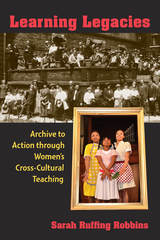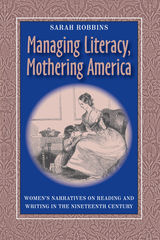

Managing Literacy, Mothering America accomplishes two monumental tasks. It identifies and defines a previously unstudied genre, the domestic literacy narrative, and provides a pioneering cultural history of this genre from the early days of the United States through the turn of the twentieth century.
Domestic literacy narratives often feature scenes that depict women-mostly middle-class mothers-teaching those in their care to read, write, and discuss literature, with the goal of promoting civic participation. These narratives characterize literature as a source of shared knowledge and social improvement. Authors of these works, which were circulated in a broad range of publication venues, imagined their readers as contributing to the ongoing formation of an idealized American community.
At the center of the genre's history are authors such as Lydia Sigourney, Catharine Maria Sedgwick, and Frances Harper, who viewed their writing as a form of teaching for the public good. But in her wide-ranging and interdisciplinary investigation, Robbins demonstrates that a long line of women writers created domestic literacy narratives, which proved to be highly responsive to shifts in educational agendas and political issues throughout the nineteenth century and beyond.
Robbins offers close readings of texts ranging from the 1790s to the 1920s. These include influential British precursors to the genre and early twentieth-century narratives by women missionaries that have been previously undervalued by cultural historians. She examines texts by prominent authors that have received little critical attention to date-such as Lydia Maria Child's Good Wives--and provides fresh context when discussing the well-known works of the period. For example, she reads Uncle Tom's Cabin in relation to Harriet Beecher Stowe's education and experience as a teacher.
Managing Literacy, Mothering America is a groundbreaking exploration of nineteenth-century U.S. culture, viewed through the lens of a literary practice that promoted women's public influence on social issues and agendas.
READERS
Browse our collection.
PUBLISHERS
See BiblioVault's publisher services.
STUDENT SERVICES
Files for college accessibility offices.
UChicago Accessibility Resources
home | accessibility | search | about | contact us
BiblioVault ® 2001 - 2024
The University of Chicago Press









